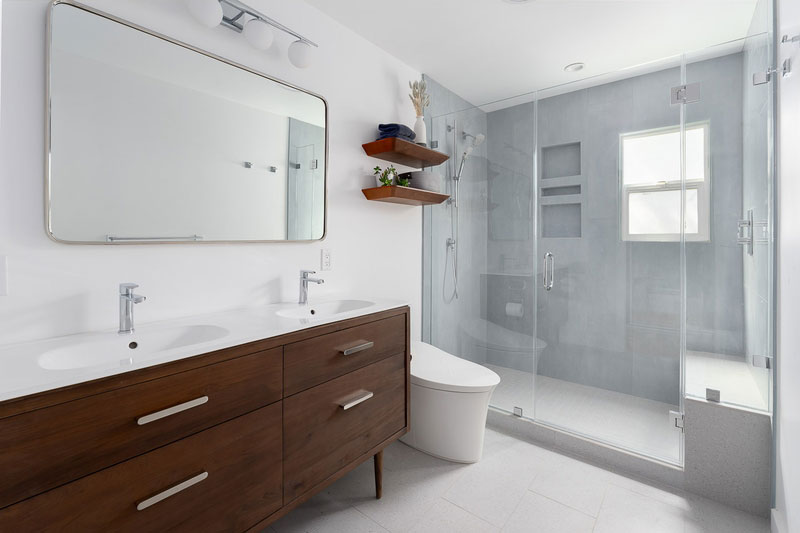September 28, 2021

What’s included and not included in bathroom remodel bids
You’ve probably heard that you should collect bids from at least 3 different contractors before making a decision on who to choose but the real differentiator is knowing that is included in those bids. The cost drivers in a bathroom remodel can be summed up into 4 categories: the demolition, labor, rough materials, and finish materials.
Most contractors will only factor in the cost of labor and rough materials but charge you separately for demolition, disposal fees, and finish material installation. So you can compare apples to apples, make sure that the bids you’re collecting cover the cost of demolition, labor, rough materials, and installation of finish materials.
Just for clarity, rough materials are the materials used in standard framing, plumbing, electrical, and mechanical construction. So this would include things like lumber products, fasteners, pipes, and electrical conduit to name a few. Whereas finish materials are those materials that give the bathroom its unique appearance. These include things like the tile, countertops, light fixtures, and the vanity to name a few.
Note that most contractors will not include the cost of finish materials in their bid. Shopping and bidding for finish materials is the responsibility of an interior designer not the general contractor.
Types of permits needed for a bathroom remodel and who is responsible for acquiring them
The types of permits you’ll need when remodeling your bathroom will depend on the work needed to be done. If you’re simply changing out aesthetic features of your bathroom such as the tiles, vanity, the plumbing fixtures, or the light fixtures, then you would need what is commonly referred to as a like-to-like remodel permit. Like-to-like permits are for remodels that do not change any of the preexisting framing, plumbing, electrical, or mechanical elements.
If your remodel requires you to make changes to the plumbing, electrical, or mechanical elements, then you would need a permit for the component you made changes to but don’t let this intimidate you.
To figure out what permit you need, simply call the building department that your home is governed by, ask to speak with the permitting department then describe the work you intend to do and ask them what permits you will need. They will be able to tell you exactly what permits you will need.
Warranty on your bathroom remodel
Building codes were designed and implemented so that your home would function and last for decades. Unfortunately, there are manufacturer defects on components and people make mistakes when working on your home. So it’s important to know that in case something does go wrong, the cost for repairs are covered.
The California State License Board requires all licensed contractors to warranty their work for up to 1 year. So if you remodel your bathroom and a few months down the road the sink leaks, call your contractor and make a warranty claim. They should make the repairs for free just as long as the issue was because of their workmanship and not a defect in an appliance or fixture.
3 tips on how to save money when remodeling your bathroom
- Get the permits yourself. You do not need to be a licensed contractor to acquire permits so by doing this part yourself, you should have a few hundred dollars for the hourly rate your contractor might charge you if they were to apply for the permit themselves.
- Buy the finish materials yourself. Hiring an interior designer to design and shop around for the finish materials can be quite expensive. If you enjoy the process of designing and visiting decor stores, then this should be an easy task for you. Our only tip is to make sure the materials are available to your contractor well in advance of when they need it and to ask your contractor how much of each finish material they need; ie: how many square feet of tile they need.
- Thoroughly research the contractor you choose. Working with a bad contractor will result in either poor work, extended timelines, expensive change orders, or all 3. To avoid this, visit the Yelp, CSLB, Google Reviews, and other review pages of the contractor you choose to find out if they have a positive track record. If they don’t have any reviews, find out why. They could just be starting out or they purposely don’t want clients leaving them reviews (red flag!).

